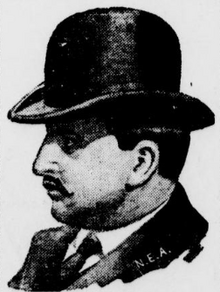Louis Cella
| Louis A. Cella | |
|---|---|

Cella drawn portrait as featured in a 1905 newspaper article.
|
|
| Born |
November 29, 1866 St. Louis, Missouri |
| Died | April 29, 1918 (aged 51) St. Louis, Missouri |
| Occupation |
|
| Net worth |
|
| Spouse(s) | Agnes Johnson Cella |
Louis A. Cella (November 29, 1866 — April 29, 1918) was an American capitalist, turfman, and political financier. In 1896, he co-founded the Cella, Adler, and Tilles investment syndicate, alongside partners Cap Tilles and Samuel Adler. The partnership, also known as C.A.T., dominated the Midwestern horse racing industry through World War I. At its height, C.A.T. had a controlling interest in 25 horse racing tracks. Additionally, C.A.T. founded the Western Turf Association, which granted Cella and his partners near monopolistic control over jockeys, bookmakers, and horse owners in the Midwest. The partnership also had one of the largest networks of in the US, with a presence in every major city in the country. Cella was nicknamed the "Dago Saloonkeeper," a reference to his early start as a saloonist before co-founding C.A.T. Cella made a fortune in real estate, commodities speculation, stock commissions, and horse racing. At the height of his career, Cella owned five large office buildings, controlled ten theaters, several hotels, and a large network of brokerages across the US.
From 1897 to 1904, Cella and his two partners had a monopoly on the St. Louis horse racing market. In 1905, gambling was abolished in Missouri after passage of the Anti-Breeders Act, and the partnership's tracks were legally forced to cease operations. Following the progressive movement's prohibition on gambling in Missouri, Cella turned his primary attention to real estate speculation and the Cella Commission Company he co-founded with his brothers. In 1910, Cella was arrested by federal marshals and extradited to Washington D.C. in the Western Union bucket shop scandal. During the trial, the prosecuting federal attorney accused Cella of perjury, which was added to the charges against him. In 1911, Cella and his investment partners were acquitted of all charges, after the Anti-Bucket Shop Act was declared unconstitutional. The ruling was seen by reformers as a setback for the progressive movement.
...
Wikipedia
